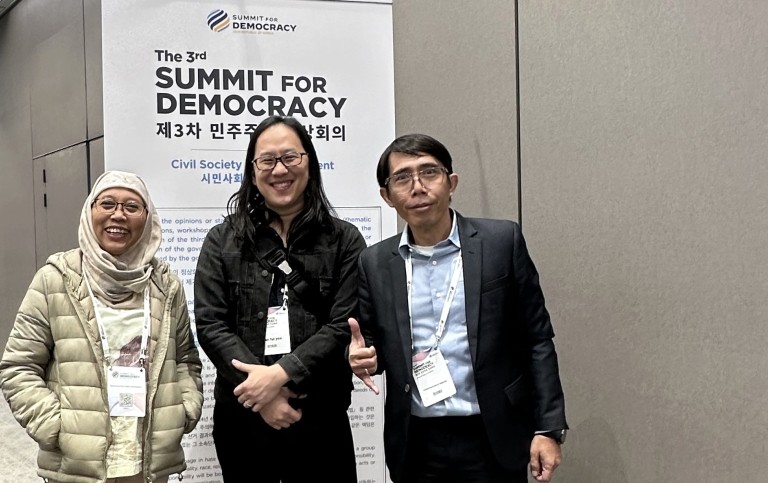Blog
CSM-STAND at S4D3: Investigative journalists’ networking and safety are paramount to accountability

For Purwani Diyah Prabandari, the third Summit for Democracy held in Seoul, South Korea in March 2024, was a reminder of how democracy is declining globally, with human rights conditions deteriorating and conflicts continuing to be widespread.
Prabandari, a Senior Editor for the Indonesia-based Tempo Magazine, joined this year’s summit to participate in a CSM-STAND’s media-focused panel discussion held during the summit, alongside Karol Ilagan, a Filipina Investigative Journalist and Educator; Ian Yee, Resident Investigative Journalist Editor for the CSM-STAND’s Empowering the Truth Tellers: Asia Investigative Reporting Network (AIR Network) program; and Bahrul Wijaksana, Chief of Party for AIR Network.
“[The Seoul sessions were] a wake-up call for the need for stronger and wider collaboration between various elements of society to restore democracy,” said Prabandari. She added that global media collaboration will be critical to this exercise.
During the panel discussion, the speakers shared insights on the CSM-STAND AIR Network interventions aimed at strengthening the collaborations referred to by Prabandari. Specifically, through the AIR Network, CSM-STAND is providing support aimed at increasing the knowledge and skills of investigative journalists; diversifying access to opportunities and leadership within the investigative journalism profession; strengthening collaboration between media and civil society for greater quality, reach, and impact of investigative reporting; and improving journalist’s newsroom security practices and risk mitigation, among other areas.
"Collaboration is essential to expose corruption, trans-border crime, and corrosive capital,” said Yee during the discussion. “By working together, journalists can pool resources, share expertise, and amplify their impact to hold the powerful accountable."
Emphasizing the importance of journalists’ protection within this collaborative framework, Ilagan noted that "the safety and security of investigative journalists are paramount.” “Without ensuring their protection, we jeopardize the essential work of uncovering truths and holding power to account," she said.
The panelists and engagement with the audience further highlighted the critical need to sustain an information environment that encourages pluralism and public debate, benefiting public interest both offline and online. Recognizing the rapid advancements in AI technologies and their impact on the media landscape, the panelists underscored the importance of sharing knowledge and best practices to maintain information integrity. Further, they stressed the need to counter information manipulation threats, strengthen societal resilience, and ensure a safe, secure, open, and free digital environment.
In concluding remarks provided by Shannon N. Green, USAID’s Assistant to the Administrator, Green stressed that supporting free and independent media is a priority for the U.S. government, and affirmed that to help mitigate the existential threat to the survival of independent media, USAID continues to promote information integrity and resilience initiative. Further, she called attention to AIR Network noting that it is one of [USAID’s] initiatives that aim to strengthen information integrity globally by advancing cooperation among private-public-civic sectors.
For Ms. Prabandari, the Summit enforced the need for stronger and wider collaboration between various elements of society to restore and strengthen democracy. Specifically, she noted that initiatives aimed at supporting global media collaborations, such as investigative journalism facilitated by AIR Network in the Southeast Asia, will be crucial to upholding democratic governance in the region.
AIR Network, funded by USAID through the CSM-STANDmechanism, is implemented by Pact in conjunction with the International Center for Journalists. Learn more about AIR Network.